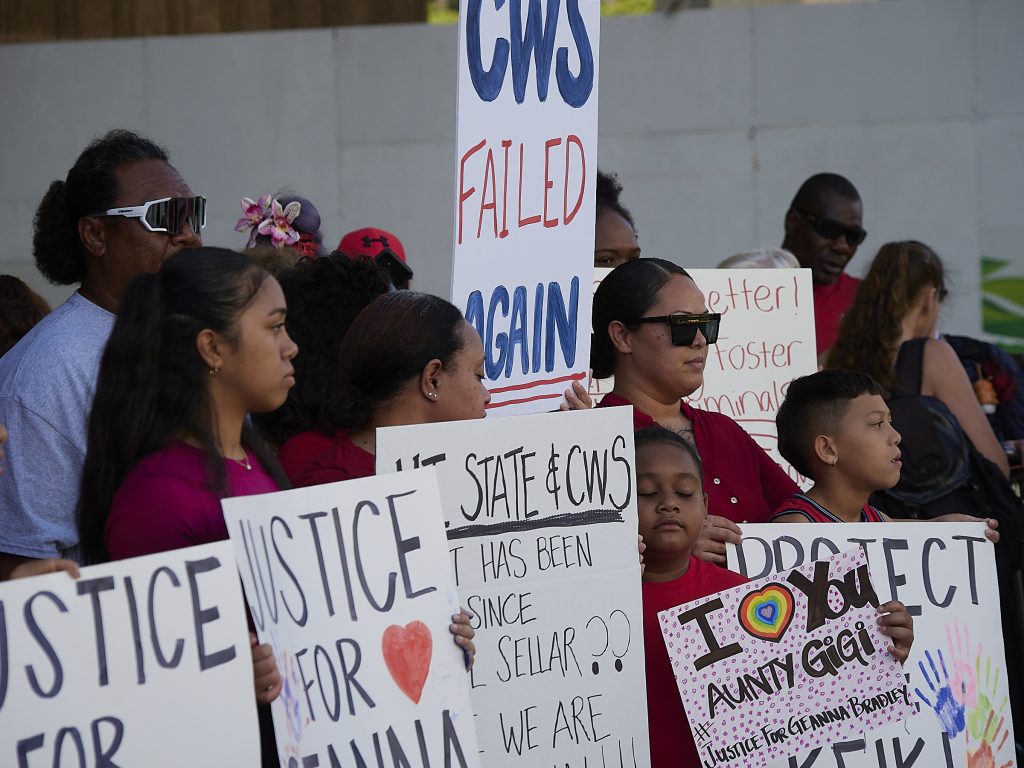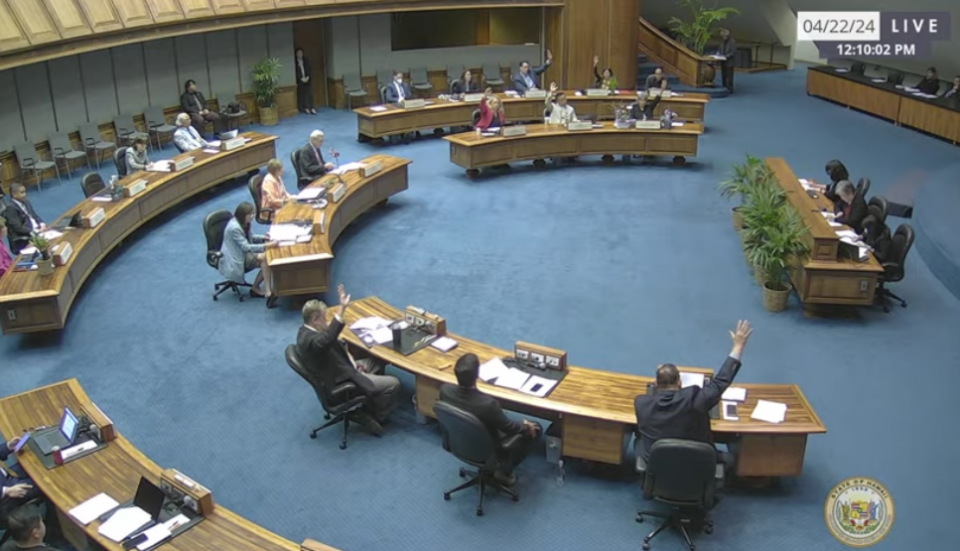Sergio Alcubilla never planned to run for Congress against U.S. Rep. Ed Case. He wanted to run for lieutenant governor instead.
Alcubilla remembers well the moment he decided to enter the political fray.
It was February 2021, deep into the Covid-19 pandemic, and he was rallying at the state capitol in support of workers who were struggling to gain access to unemployment benefits. At the time, Alcubilla was a board member for the Hawaii Workers Center, which had helped organize the demonstration.
Standing in the open air rotunda, he looked up and saw people staring over the railings.
The legislative session was in full swing, but due to coronavirus safety precautions the building was closed to the public. Among the only people allowed in were lawmakers, staff and lobbyists.

“We were there at the bottom and people were looking down at us,” Alcubilla said. “We had hundreds of people there and they were rallying for help. Some of them had waited months for their unemployment insurance. I was feeling so frustrated that day because there was this sense that nobody really cared about your average, everyday worker.”
Alcubilla first considered running for lieutenant governor since it’s a position with few official duties — certifying legal name changes being the primary responsibility — and lots of leeway to take on special projects.
Then he had a conversation with one of his mentors, who, like him, is a Filipino immigrant.
Bookmark this page! It’s where we’re collecting news coverage, candidate Q&As, a guide to the ballot and much more.
Amy Agbayani is an emeritus vice chancellor of student diversity and equity at the University of Hawaii Manoa, an immigrant rights advocate and a respected member of Hawaii’s sizable Filipino community.
She’s also politically connected.
Last year, Agbayani was named to President Joe Biden’s advisory commission on Asian Americans, Native Hawaiians and Pacific Islanders to help the administration push back against anti-Asian hate and develop new policies to provide more opportunity to the AANHPI community.
When Alcubilla asked Agbayani about the lieutenant governor’s race, she quickly steered him away from what promised to be a crowded field that has since grown to include well-known candidates such as state Rep. Sylvia Luke, former Honolulu City Council chairman Ikaika Anderson and Chamber of Commerce Hawaii president Sherry Menor-McNamara, and toward Hawaii’s 1st Congressional District, where Case had yet to draw a serious challenger since winning the seat in 2018.
Agbayani saw an opening for Alcubilla, she said, in part because he was a progressive Democrat who could attack Case from his left.
She also thought Alcubilla could take advantage of Case’s antagonistic position toward Biden’s $3.5 trillion Build Back Better spending plan that sought to raise taxes on the rich to help address some of the nation’s most intractable issues, from affordable housing and childhood poverty to climate change.
Case was one of only a handful of moderate Democrats who initially held up passage of the bill due to concerns about its overall costs and his desire to pass a separate bipartisan infrastructure plan. He was the only one who represented a safe Democratic district. The others were on the frontlines of GOP efforts to retake the House in 2022.
“He was totally tone deaf,” Agbayani said, pointing out that many of Hawaii’s residents are already struggling with low wages, a high cost of living and the reality of residing on islands threatened by warming temperatures and rising sea levels.
“The Build Back Better bill was the last straw,” she said. “I told Sergio this is a very important race and we need someone to really articulate those positions.”
Alcubilla has leaned into the progressive messaging in an attempt to separate himself from Case, a fiscally conservative Democratic moderate who is a co-chair of the famously centrist Blue Dog Coalition.
Build Back Better is a centerpiece of Alcubilla’s platform so much so that it comes first under the “Issues” tab on his campaign website — even though BBB is dead.
It’s quickly followed by Medicare for All, affordable housing and raising the federal minimum wage from $7.25 to $15 an hour. He supports a year of paid family leave for new parents, the legalization of recreational marijuana and eliminating tuition for community colleges and state universities.

He backs shutting down the U.S. Navy’s Red Hill fuel storage facility and working with Compact of Free Association migrants to ensure that they’re cared for in Hawaii — issues that Case has championed as well — and that the U.S. military address the environmental catastrophes it caused from nuclear testing in their islands.
“I want to make sure that we put people first and put the planet first,” Alcubilla said. “Really, the core of my campaign is to give a voice to people who have long been ignored.”
Alcubilla, who was born in the Philippines, immigrated to the U.S. when he was 7 after his father was assassinated during the People Power Revolution that ousted dictator and president Ferdinand Marcos. According to Alcubilla’s website, his father was a military police officer and was killed by “a communist hit-squad.”
After 9/11, he spent two years in upstate New York at the Unification Theological Seminary, which was a school founded by Rev. Sun Myung Moon, a self-proclaimed messiah from Korea who some had described as a cult leader. Moon’s organization, known colloquially as the Unification Church, was known for performing mass wedding ceremonies and spreading anti-gay rhetoric. Its followers were often referred to as “Moonies.”
Alcubilla has been upfront about his time with the Unification Church and has included a lengthy blog post on his campaign website explaining the reasons he joined and later stepped away.
As he wrote, “I did not agree with many of its values towards the LGBTQ community and especially seeing how many of the members lived impoverished, difficult lives while those at the top of its leadership did not.”
Moon, who died in 2012, was a multimillionaire who owned a number of business ventures, including the conservative Washington Times newspaper. He was convicted in 1982 of tax fraud and conspiracy.
In Hawaii, Alcubilla worked as an attorney for the Legal Aid Society and is a board member of several organizations, including the Hawaii Filipino Lawyers Association, the Filipino Young Leaders Program and the Hawaii Workers Center.
He said he’s now focusing full-time on his campaign while his wife, who is a nurse, helps to support him and their two children, ages 8 and 10.
Alcubilla often talks up his humble beginnings and contrasts that with Case, also a lawyer, and other members of Congress, many of whom, including Case, are millionaires.
“Even though we’re both attorneys we have completely different world-views,” Alcubilla said.
This is Alcubilla’s first foray into politics, and he’s taking on an incumbent who’s spent nearly two decades in public office, first in the state House of Representatives and then as a member of Congress, representing both urban and rural communities throughout the islands.
Even though he’s been campaigning since at least October, he is struggling to raise enough money to compete financially against Case.
Alcubilla raised just over $76,000 for his campaign through the first quarter of the year, which is the most recent data available from the Federal Election Commission. According to his FEC filings, he already spent most of that money and had less than $10,000 left over by the end of March. Case, meanwhile, reported having more than $720,000 in cash on hand at the end of that filing period.
John Hart, a professor of communication at Hawaii Pacific University and long time political pundit, said it’s hard to see a path for Alcubilla given the disparity.
“The bottom line is you’ve got an untested progressive with no money running against an established Democratic incumbent,” Hart said. “I think it would be very difficult to envision a scenario where the challenger will be successful.”

Alcubilla has some outside support, most notably from the Hawaii State Teachers Association, which earlier this month endorsed him over Case.
Alcubilla has also garnered the support of the state’s 18,000-strong International Longshore and Warehouse Union, no doubt due to his support of the Jones Act, a century old maritime law that requires shipping between U.S. ports to be conducted by American-made vessels that are U.S. flagged and operated.
Case and a number of conservative-leaning organizations, including the Grassroot Institute of Hawaii and Cato Institute, have long argued that the Jones Act contributes to Hawaii’s high cost of living and should be reformed to ease the burden on island residents.
Alcubilla, on the other hand, argues along with much of the rest of Hawaii’s Democrats, including other members of the federal delegation, that the Jones Act is necessary to protect jobs, the environment and national security.
Another organization that’s primed to back Alcubilla is Our Hawaii Action, which has already spent more than $100,000 on an ad campaign targeting Case over his initial opposition to Biden’s Build Back Better agenda. Our Hawaii Action has a mission of taking corporate money out of island politics and has vowed to support candidates, such as Alcubilla, who swear off donations from PACs and lobbyists tied to companies.
In contrast, Case has received a majority of his money from PACs representing a range of special interests, from organized labor to military defense contractors.
In a text message, Case said he was unavailable for an interview. He did, however, point out that he voted for a trimmed down version of Build Back Better that ultimately failed in the Senate and that he was “proved right” about the $1.2 trillion bipartisan infrastructure deal, which he said will bring billions of dollars to the islands. His concern, he said, was that if the two bills were linked that both would die.
Case also noted that he’s been endorsed by the Hawaii Government Employees Association, which is the state’s largest union, and that he’s received an “A” rating from the National Education Association, which is the parent organization of the HSTA.
He also pointed to 100% legislative scorecard ratings he’s received from Planned Parenthood, the League of Conservation Voters and the ACLU.
Alcubilla said he’s realistic about his chances against Case. But he said he also wants to make sure voters have another option than the status quo.
Case won his seat in 2018 after jumping into a crowded field at the last minute, and in 2020 he didn’t even draw a Democratic challenger.
“I know it’s not a cakewalk to take on a corporate-backed incumbent who has hundreds of thousands of dollars,” Alcubilla said. “But this time around, when there are only two names on the ballot, we’re giving people a real choice.”
 Sign up for our FREE morning newsletter and face each day more informed.
Sign up for our FREE morning newsletter and face each day more informed.
Civil Beat is a small nonprofit newsroom that provides free content with no paywall. That means readership growth alone can’t sustain our journalism.
The truth is that less than 1% of our monthly readers are financial supporters. To remain a viable business model for local news, we need a higher percentage of readers-turned-donors.






